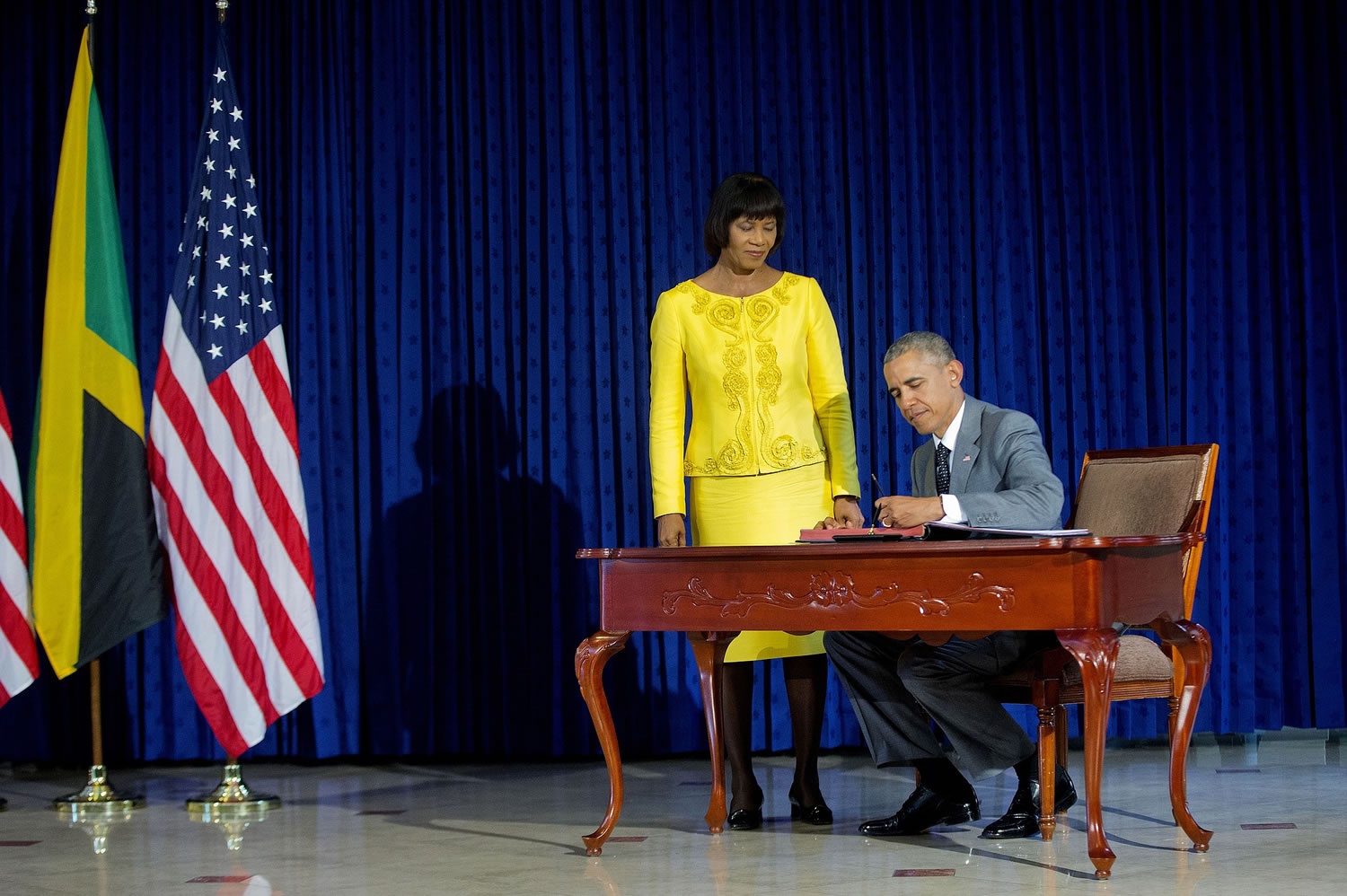KINGSTON, Jamaica — President Barack Obama will act soon on a recommendation about whether to remove Cuba from the U.S. list of state sponsors of terrorism, he said Thursday as he opened a three-day trip to the Caribbean and Central America.
Obama has long signaled he’s willing to take Cuba off the list as part of his broader move to reopen diplomatic relations with the island nation. Havana has eagerly sought removal from the list, but Obama has kept the decision at bay, citing a formal review process that had to be completed by the U.S. State Department.
Speaking after meeting with Jamaican Prime Minister Portia Simpson Miller, Obama said that review is now complete and he’s awaiting the actual recommendation from his aides. His decision could come as soon as this week, when Obama and Cuban President Raul Castro are both in Panama to attend the Summit of the Americas.
“Throughout this process, our emphasis has been on the facts,” Obama said. “We want to make sure that given this is a powerful tool to isolate those countries that genuinely do support terrorism, that when we make those designations, we’ve got strong evidence that’s the case and as circumstance change, that list will change as well.”
Cuba is one of just four countries still on the U.S. list of countries accused of repeatedly supporting global terrorism; Iran, Sudan and Syria round out the list. The designation not only offends Cuba’s pride but also restricts Havana’s access to credit and financial systems.
Cuba’s continuing presence on the list has been a sticking point in the effort to restore ties between the two countries. Yet there have been indications that the U.S. has held back on granting Cuba a reprieve while other thorny issues — such as restrictions on U.S. diplomats in Havana — are still being resolved.
Obama commented on the first full day of his trip to Jamaica and Panama, where he hopes to make inroads in the face of expanding Chinese influence and weakening power by Venezuela, once the energy juggernaut of the Americas. Simpson Miller thanked Obama for taking action to improve relations with Cuba — “our closest neighbor.”
“We’re very happy to say to you, Mr. President, you are on the right side of history,” Simpson Miller said.
The visit to Jamaica comes amid a perception that Obama’s interest in the region has failed to materialize. Yet his travels — first to Jamaica, then to the Summit of the Americas in Panama — follow a year of increased attention to the region by the U.S. president. His immigration executive orders, his efforts to slow the influx of Central American minors to the U.S. border and his diplomatic outreach to Cuba have put a foreign policy spotlight on U.S. neighbors to the south.
After a low-key arrival in Kingston on Wednesday evening, Obama promptly paid tribute to the late reggae star Bob Marley, Jamaica’s cultural hero, with an unannounced visit to his museum. Obama toured Marley’s former home as Marley’s hit “One Love” played through the building’s sound system.
“The quick trip that I made last night to Bob Marley’s house was one of the more fun meetings that I’ve had since I’ve been president,” Obama said on Thursday, adding that he’s a lifelong fan.
Energy security tops Obama’s agenda as the U.S. seeks to fill a potential void left by Venezuela’s scaled-back oil diplomacy. Earlier this year, Vice President Joe Biden hosted prime ministers and other top officials from all Caribbean countries except Cuba at the first Caribbean Energy Security Summit in Washington.
At a meeting with other leaders in the 15-member Caribbean Community, Obama vowed greater cooperation to help the region move toward cleaner, more affordable energy.
“This region has some of the highest energy costs in the world,” Obama said. “Caribbean countries are particularly vulnerable to the effects of climate change. And we have to act now.”
Obama also was speaking Thursday to young regional leaders in a town-hall setting, continuing a tradition of engaging new generations in foreign political and civil society institutions.
In a written interview with EFE News before his arrival in Panama, Obama continued his administration’s efforts to soften the impact of his announced sanctions against seven Venezuelans in protest of President Nicolas Maduro’s crackdown on political opponents. Maduro has characterized the sanctions as direct aggression against Venezuela.
“We do not believe that Venezuela poses a threat to the United States, nor does the United States threaten the Venezuelan government,” Obama said, although he added that the U.S. remains “very troubled” by intimidation of political opponents and erosion of human rights in Venezuela.
Obama’s visit to Jamaica is the first by a U.S. president since President Ronald Reagan in 1982.



